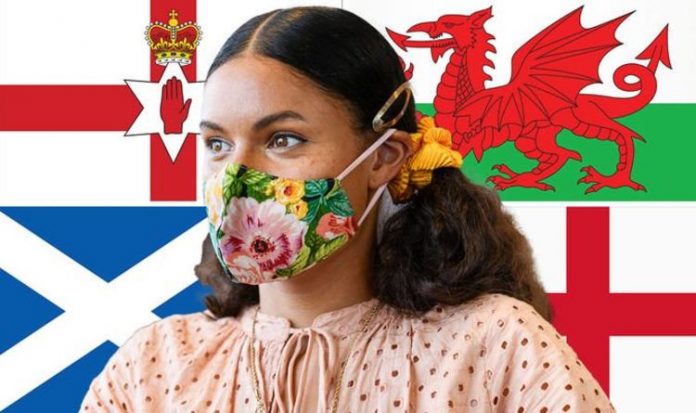Coronavirus rules are constantly changing as authorities react to the medical evidence about the presence of covid across the UK. Evidence indicates the spread of the virus is accelerating with the R rate, which tracks the disease’s ability to spread by stating the number of people that one infected person will pass on a virus, estimated to be between 1.1 and 1.4. But what are the rules?
Government advisers Professor Chris Whitty and Sir Patrick Vallance will use a televised briefing on Monday to warn the UK about the current crisis.
The advisers are expected to warn that the UK is at a “critical point” and facing a “very challenging winter”.
Across the UK, at least 13.5 million people are now living in areas with lockdown measures.
Many experts have proposed introducing a “circuit break” mini lockdown which would see measures such as pub and bar curfews in force across the country.
Health officials confirmed the highest number of coronavirus cases since May 8 over the weekend.
The Government announced 3,899 new cases on Sunday following three days running of new cases of more than 4,000 each day.
Cases began climbing once again in July after they fell dramatically following the full lockdown in March.
READ MORE: Holidays: Iceland could be next on quarantine list
What are the covid rules in England?
The Office for National Statistics (ONS) estimates roughly one in 900 people in England had coronavirus in the week ending September 10 according to recent data.
The figure for the previous week was one in 1,400 people.
There are several hot spots across the country with parts of the Midlands, Lancashire, Merseyside and West Yorkshire the latest places to see extra measures announced.
In England, there have been 339,901 cases of coronavirus since the beginning of the pandemic which equates to a rate of 603.9 per 100,000 people.
This month, people in England are banned from meeting in groups of more than six of any age and multiple households, indoors or outdoors, including private homes, restaurants, pubs and parks.
Exceptions in England include:
- Households or support bubbles larger than six
- Education and training
- Workplaces
- Protests and political events
- Jury duty and other legal commitments
- Children’s playgroups and other youth groups
- Support groups such as for abuse or addiction.
In terms of social distancing, all nations are advised to stay two metres apart from those outside their households, but in England you can stay “1m plus” apart.
The plus part means doing something else to limit exposure such as wearing face coverings.
In England you must wear a face covering in the following settings:
On public transport and at transport hubs
- In shops, supermarkets, shopping centres, auction houses
- In premises providing professional, legal or financial services
- In premises providing personal care and beauty treatments
- In premises providing veterinary services
- At visitor attractions and entertainment venues
- At libraries and public reading rooms
- At places of worship
- At funeral service providers
- At community centres, youth centres and social clubs
- At exhibition halls and conference centres
- In public areas in hotels and hostels
- At storage and distribution centres.
DON’T MISS
Fines for covid: What lockdown breaches can you be fined for? [INSIGHT]
Piers Morgan savages Matt Hancock ahead of This Morning interview [EXPLAINER]
Tory chaos: Graham Brady lashes out at Boris for not debating [ANALYSIS]
What are the covid rules in Northern Ireland?
Northern Ireland has confirmed 9,341 cases of coronavirus since the outbreak began, with a rate of 493.3 per 100,000 people.
Up to 15 people are permitted to meet outdoors in Northern Ireland, while up to six people from two households can meet indoors.
In Northern Ireland, social distancing guidance requires people to keep at two-metre distances from those outside their own households.
Face coverings are mandatory on public transport, shops, supermarkets and shopping centres.
In Northern Ireland, apart from shops, the rule includes “any other indoor place where goods or services are available to buy or rent… for example, a bookmaker’s, a food takeaway business or a dry cleaner”.
What are the covid rules in Scotland?
In Scotland there have been 24,371 confirmed cases of the virus, with a rate of 446.1 per 100,000 people.
The limit of up to six people from multiple households meeting up applies both indoors and outdoors for those aged 12 and over from two households in Scotland.
There are exceptions to the two-metre rule in some places, such as pubs and restaurants for the two-metre social distancing rule.
Children aged 11 and under do not need to observe social distancing.
Face masks are compulsory on public transport, at transport hubs and in shops, supermarkets and shopping centres.
The Scottish Government said all pupils aged 12 and over should wear face coverings in corridors and communal areas, but not in classrooms.
Everyone aged five and over must wear masks on school buses.
What are the covid rules in Wales?
In Wales there have been 20,644 confirmed cases of the virus, with a rate of 654.8 per 100,000 people.
Gatherings are limited to up to six people indoors, although those aged under 11 are exempt from this total.
Up to 30 people are permitted to meet in outdoor settings.
The two-metre distance should be observed unless it is unrealistic such as at the hairdressers.
Primary school children in Wales are exempt from social distancing rules.
Face masks must be worn on public transport, at passenger hubs, in shops, supermarkets and shopping centres.
In Wales, face coverings are recommended in high schools when social distancing is “unlikely to be maintained”, but are not compulsory.
Welsh schools and councils can decide if they should be used.







